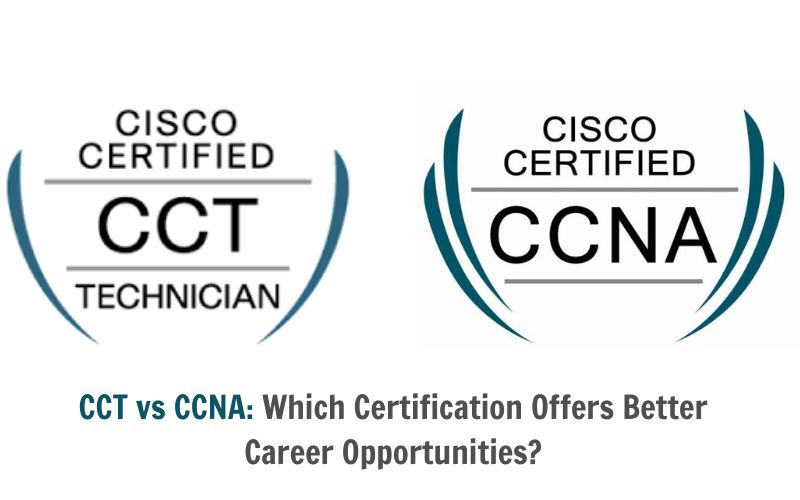If you are considering pursuing a career in the field of networking, you may have come across the term CCNA. The Cisco Certified Network Associate (CCNA) is an entry-level certification that validates the skills required to configure, operate, and troubleshoot medium-sized networks. However, many aspiring networking professionals wonder how difficult it is to obtain this certification. In this article, IT Exams will explore the CCNA difficulty and provide tips to help you prepare for the exam.
What Is CCNA?
Before we go into the difficulty level of CCNA tests, let’s first define this qualification. Cisco Systems, a global technology leader in networking solutions, offers an associate-level certification called CCNA. The CCNA credential certifies the knowledge and abilities needed to install, configure, operate, and troubleshoot medium-sized networks.
Network basics, LAN switching technologies, routing technologies, WAN technologies, infrastructure services, and infrastructure security are all covered in the certification.
Understanding How Hard Is CCNA

Now that we know what CCNA is, let’s speak about how tough it is to earn this certification. The difficulty level of CCNA varies depending on prior knowledge and expertise in the field of networking. However, in general, the CCNA is regarded as a reasonably tough qualification.
CCNA Exam Format
Pearson VUE, a global leader in computer-based testing, administers the CCNA exam on a computer. The test includes 50-60 questions in a variety of forms, including multiple-choice, drag-and-drop, simulation, and simlet questions. According to CCNA requirements, candidates must complete the test in 90 minutes.
Multiple-choice questions require the applicant to select one or more right answers from a list of possibilities. Drag-and-drop questions need the applicant to drag and drop things into the right sequence or place. The simulation questions give the applicant a virtual network environment that he or she must configure or troubleshoot. The simlet questions create a situation in which the applicant must respond to many connected questions.
Depending on the route you pick, the CCNA certification test comprises one or more examinations. The CCNA Routing and Switching track is the most popular, and it comprises two exams: ICND1 (100-105) and ICND2 (200-105).
The test questions are drawn at random from a pool of questions, ensuring that no two exams are identical. Cisco does not officially announce the passing score for the CCNA test, however, it is widely assumed to be around 825-850 out of a potential 1000 points.
Candidates should acquaint themselves with the test format and question types, as well as the exam objectives and weightings, in order to prepare for the CCNA exam. They should also practice utilizing a variety of study tools, including textbooks, online courses, practice examinations, and laboratories, to guarantee a thorough grasp of the ideas and technology included in the exam. They should also participate in a study group or online community to discuss and share their expertise with other candidates.
CCNA Exam Content

Network basics, LAN switching technologies, routing technologies, WAN technologies, infrastructure services, infrastructure security, and automation and programmability are all included in the CCNA test material. Each topic is further subdivided into subtopics, with test objectives for each provided on the Cisco website.
Network fundamentals cover fundamental networking topics such as the OSI and TCP/IP models, network topologies, protocols, and cabling. It also covers Ethernet LAN basics, wireless LANs, and IPv4 and IPv6 addressing.
LAN switching technologies cover LAN switching technologies such as VLANs, trunking, STP, and EtherChannel. It also involves the setup of VLANs and inter-VLAN routing.
Routing technologies cover the concepts such as static and dynamic routing, distance vector and link-state routing protocols, and routing protocol implementations such as OSPF and EIGRP.
WAN technologies cover WAN concepts such as VPN, PPP, and MPLS. It also provides PPP, GRE, and rudimentary VPN implementation.
Infrastructure services cover the concepts of DHCP, DNS, and SNMP. It also includes the implementation of DHCP and DNS services, and network management using SNMP.
Infrastructure security covers network security principles such as fundamental network security, ACLs, and firewalls. It also involves the setup of NAT and PAT.
Automation and programmability cover network automation and programmability principles such as Python, REST APIs, and network programmability protocols like NETCONF and YANG.
In addition to the topics listed above, the CCNA exam examines the candidate’s practical abilities via simulation and simlet questions. These questions ask the applicant to do particular tasks in a virtual network environment, such as setting a switch or router, diagnosing a network problem, or adding a security feature.
How Hard Is CCNA?

Is CCNA hard? The CCNA is a challenging exam for novices since it places a lot of emphasis on your abilities to setup Cisco equipment and solve genuine networking problems. As a result, novices may require many months of practical training using real equipment or a simulator in order to be ready for these test goals.
What truly sets out the Cisco CCNA from other entry-level IT certification tests on the market, including the Network+ (more on that in a moment), is this demand for hands-on configuration. While it is possible to acquire the networking principles covered on the CCNA exam via a textbook or video course, mastering the configuration commands tested on the exam simply requires practice. Without actually performing these tasks in a lab setting, it would be extremely difficult for someone to master this portion of the exam efficiently.
A minimum 825 out of 1000 is required to pass the CCNA exam. Although it can seem like a high bar to clear, it is definitely reachable with the right preparation. Subnetting and router and switch configuration are common problems, and the test material may be challenging to comprehend.
In summary, the CCNA test is challenging and demands a solid understanding of networking theory and technology.
CCNA Preparation Tips
Preparing for the CCNA test might be difficult, but with the appropriate attitude and tools, it is doable. Here are some preparation recommendations for the exam:
- Make a Study Plan: Before you start studying, make a study plan outlining your goals and a realistic schedule for accomplishing them. you keep on track, be sure you allot appropriate time to each topic and subtopic and schedule regular study sessions.
- Use Multiple Study Materials: Do not rely on a single study material to prepare for the test. To guarantee a thorough comprehension of the material, use a combination of textbooks, online courses, practice examinations, and labs.
- Practice Your Practical Skills: The CCNA exam assesses both your practical skills and your understanding of the subject. Use virtual lab environments or actual equipment to practice setting switches and routers, diagnosing network faults, and installing security measures.
- Join Study Groups or Online Communities: Participating in a study group or online community may be a terrific method to gain assistance from other candidates while also sharing your own expertise and experience. It can also assist you in being motivated and on track with your academics.
- Take CCNA Practice examinations: Taking practice examinations will help you measure your exam preparation and highlight areas where you need to focus your learning. Use reputable CCNA practice tests that are formatted and content-wise close to the real exam.
- Manage Your Time During the Test: Manage your time carefully during the test to ensure that you have adequate time to answer all of the questions. If you get stuck on a question, don’t dwell on it; move on and return to it later if you have time.
- Maintain Your Focus: Finally, remember to remain cool and concentrated throughout the examination. Take deep breaths, attentively read each question, and don’t let anxiety or distractions interfere with your performance.
By following these preparation recommendations and devoting enough time and effort to your study, you may improve your chances of passing the CCNA test and launching your networking career.
CCNA Test-taking Strategies

The CCNA exam is a difficult exam that necessitates not just a thorough understanding of networking ideas and technology, but also good test-taking tactics. In this part, we’ll look at various CCNA test-taking tactics that will help you ace the exam.
Use Your Time Wisely
The CCNA test has a limited time constraint of 90 minutes, therefore you must manage your time wisely. Don’t devote too much time to any single question. If you come across a question about which you are unsure, skip it and go on to the next one. You may always return to it later if you have the time.
Take your time reading the question.
Make sure you thoroughly read each question and comprehend what it is asking. Look for terms and phrases that can help you limit your options. Take your time answering the questions and make sure you understand what is being asked.
Use the Elimination Process
If you are unsure about an answer, attempt to remove the incorrect responses first. This might help you limit your options and boost your chances of choosing the perfect one. This approach can also be used to remove responses that are similar but not quite correct.
Make use of Scratch Paper.
Make use of the scratch paper provided by the CCNA test. Use it to jot down crucial information like IP addresses, subnet masks, and other pertinent details. This can assist you in avoiding errors and ensuring that you have all of the knowledge required to answer the questions.
Use simulations to practice.
The CCNA exam contains simulations that assess your knowledge of network and switch configuration. To become acquainted with the process, use simulation tools such as Cisco Packet Tracer. This might make you feel more secure and at ease when faced with simulations on the test.
You may improve your chances of success on exam day by using these CCNA test-taking tactics. Remember to manage your time effectively, attentively study the questions, apply the process of elimination, scratch paper, and practice with simulations. You may achieve your CCNA certification and take the first step toward a successful career in networking with the correct preparation and techniques.
FAQs
How hard is the CCNA exam?
The CCNA exam’s difficulty level varies from person to person. However, it is generally regarded as a reasonably tough certification.
What topics are covered in the CCNA exam?
Network principles, LAN switching technologies, routing technologies, WAN technologies, infrastructure services, and infrastructure security are all covered in the CCNA test.
How can I prepare for the CCNA exam?
To prepare for the CCNA test, you should first grasp the exam objectives, then create a study plan, use numerous study resources, practice, and, if feasible, join a study group.
What are the benefits of obtaining CCNA certification?
Obtaining CCNA certification can lead to better job opportunities, higher salaries, and professional recognition in the field of networking. For more details, you can read our article focusing on the CCNA average salary!
Final Words

The CCNA certification is a valuable credential for anyone interested in pursuing a career in networking. While the exam can be challenging, with the right preparation and strategies, it is possible to succeed. By understanding the exam format and content, studying effectively, and practicing with simulations, you will find the answer to the question “How hard is CCNA?“.
Remember that the CCNA certification is only the beginning of your networking career. Long-term success requires continuous learning and remaining current with the newest technology and industry trends. By implementing the CCNA test-taking tactics mentioned in this article, you may improve your chances of passing the exam and embark on a rewarding career in networking.
[Sassy_Social_Share]


